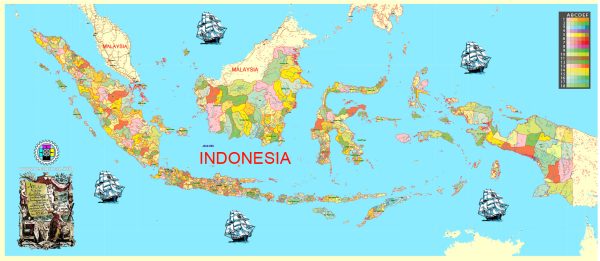Indonesia is a diverse and complex country located in Southeast Asia, and it is the world’s largest archipelago, comprising thousands of islands.
Population and Demographics:
- Indonesia is the fourth most populous country in the world, with a population exceeding 270 million people. The population is culturally and ethnically diverse, with over 300 different ethnic groups and languages spoken. The majority of the population is of Malay ethnicity, and the country has a significant Muslim majority.
Economy:
- Indonesia has a mixed economy with both agriculture and industry sectors. It is classified as an emerging market and is one of the world’s largest economies.
- Key industries include manufacturing, mining, agriculture, and services. Indonesia is known for its production of palm oil, rubber, coffee, and coal, among other commodities.
- In recent years, Indonesia has experienced steady economic growth. However, income inequality is a significant issue, with a wide gap between urban and rural areas.
Poverty and Inequality:
- Poverty remains a challenge in Indonesia. While the country has made progress in reducing poverty, significant disparities exist between urban and rural areas. Poverty rates are generally higher in rural regions, and efforts have been made to address these disparities.
Education:
- Indonesia has made improvements in its education system, with increased access to education at all levels. However, the quality of education still varies, and there are disparities in access to quality education, particularly in remote and rural areas.
Healthcare:
- Healthcare services have improved, but access to quality healthcare can be limited in some regions. The government has made efforts to expand healthcare coverage and improve health outcomes, including maternal and child health.
Infrastructure:
- Indonesia has invested in infrastructure development, including transportation and communication networks. However, challenges remain, particularly in remote areas.
Environmental Issues:
- Indonesia faces environmental challenges, including deforestation, air and water pollution, and habitat destruction. The country is also prone to natural disasters such as earthquakes and volcanic eruptions.
Urbanization:
- Urbanization is on the rise, with a significant portion of the population living in urban areas. Jakarta, the capital, is a sprawling megacity with its share of urban challenges.
Government and Politics:
- Indonesia is a democratic republic with a multi-party system. It has a history of political stability since the late 1990s and underwent a successful transition to democracy.
Please note that conditions in Indonesia can change rapidly, and this description may not reflect the most current developments in the country. It’s advisable to consult up-to-date sources for the latest information on Indonesia’s socio-economic situation.


 Author: Kirill Shrayber, Ph.D. FRGS
Author: Kirill Shrayber, Ph.D. FRGS